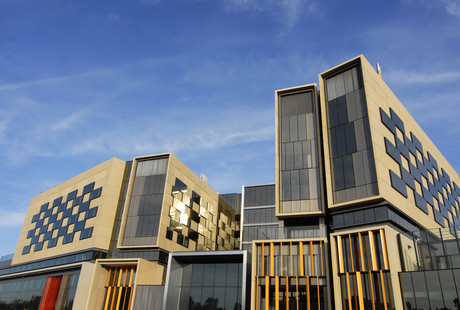Winners announced for 2017 Victorian Premier's Sustainability Awards

The Victorian Government and Sustainability Victoria last week announced the 10 winners of the 2017 Premier’s Sustainability Awards, recognising and celebrating Victorians who are leading the way to a sustainable future.
This year the awards received the broadest cross-section of entries in their 15-year history, with the 29 finalists showcasing ingenuity and innovation in the way Victorians approach sustainability. One winner was announced for each of the 10 categories, with two of these winners personally selected by Victorian Premier Daniel Andrews to receive the Premier’s Recognition Award and the Premier’s Regional Recognition Award respectively.
The 2017 Premier’s Recognition Award was presented to eWater Systems, also the winner of the Innovative Products or Services Award, for its use of ‘water-splitting’ technology as an alternative to packaged chemicals that kills bacteria without affecting food taste. The chemical-free technology is suitable for companies committed to sustainable, organic processing and food waste reduction, such as hospitals, schools, manufacturing businesses and restaurants.
The Premier’s Regional Recognition Award went to Exemplar Health (NBH) Partnership for designing and building the new Bendigo Hospital (pictured), a job which also won the consortium the Large Business Award. Said to be the largest regional hospital development in Victoria, the hospital integrates sustainable thinking into all elements of its design, construction and systems: from temperature, daylight and airflow, to material selection, external views and courtyards, and energy consumption and collection.
Other awardees can be found below.
Built Environment — Nightingale Housing, for Nightingale 1
Nightingale Housing is a not-for-profit enterprise that works to the Nightingale Model — a housing development system that enables like-minded architects to develop design-led, multiresidential housing that is environmentally, financially and socially sustainable.
Community — The Nature Conservancy Australia, for the Shuck Don’t Chuck Recycling Project
The Nature Conservancy Australia is rebuilding reefs with leftover oyster shells collected from local seafood restaurants. Shells are quarantined and cured for six months then re-used as new oyster and mussel reef habitat, diverting that waste from landfill and creating a healthier bay by improving water quality and habitat.
Education — CERES, for Sustainability and Alternative Pathways
CERES is said to be the largest deliverer of environmental education in Australia and provides alternative education pathways for adults and youth in sustainability. In 2016, the group created new courses, workshops and opportunities for community members and marginalised groups, and reached an estimated 1,000,000 people through its various programs.
Environmental Justice — Friends of the Earth, for Coal and Gas Free Victoria
Friends of the Earth Melbourne has initiated an awareness campaign in regional Victoria to alert communities to the potential threat of fracking, hosted an information roadshow and helped to organise more than 100 public forums.
Environmental Protection — Moonlit Sanctuary Wildlife Conservation Park, for Orange-bellied Parrot Breeding for Recovery
The Orange-bellied Parrot (OBP) National Recovery Plan calls for a sustainable captive breeding program of 400 birds to ensure against extinction and enable their successful release. Moonlit Sanctuary seized the opportunity to become a cornerstone of the plan, designing a 20-aviary complex for up to 40 breeding birds and 100 offspring.
Government — Moreland City Council, for Addressing Urban Heat in a Warming Climate (Moreland Urban Heat Island Effect Action Plan)
Moreland has led the way in addressing the critical issue of urban heat, with the Urban Heat Island Effect (UHIE) Action Plan 2016–2026 setting a clear approach for Moreland City Council and mapping out vital projects required to transition to a cooler, greener and more livable city.
Health — Western Health, for the Single Use Metal Instruments Recycling Program
Single-use metal instruments used by clinicians are an obvious wastage of precious metals that are quite recyclable. In 2016 Western Health successfully rolled out the Single Use Metal Instruments (SUMI) recycling program, which saw approximately 500 kg of steel recycled in the year — around 80% of all SUMIs purchased.
Small and Medium Enterprises — Kingfield Galvanizing, for the Sustainable Hot Dip Galvanizer
Kingfield Galvanizing recently invested $20 million in a state-of-the-art hot dip galvanising manufacturing plant. The company’s fully enclosed pretreatment, drying and hot dip facilities prevent emissions from entering the atmosphere. Waste created from the galvanising process is recycled and re-used, heat from the furnace is reclaimed, water is recycled within the plant and energy consumption per tonne is reduced.
Berrima Cement Works upgrades with sustainable tech
Boral has unveiled new carbon-reducing technology at the site, which supplies 40% of cement in...
Australian orgs partner to speed circular economy
GS1 Australia has joined forces with the Product Stewardship Centre of Excellence to drive the...
Victorian utility recognised at Asian Water Awards
South East Water won two awards for its Hydrotrak Geofencing technology, which has helped it to...









